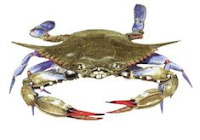 Some of my best memories growing up 40 years ago were of standing at the end of the wooden pier on hot, sticky summer afternoons and throwing chicken necks on strings into the Elizabeth River. We kids would patiently tend the lines and whenever we felt a strong tug, it meant that a blue crab was trying to make off with the bait. We’d draw up the string, slowly, slowly, so as not to spook the crustacean until it was visible just beneath the water’s surface. Then we’d swoop in with a net and scoop it up. Next would follow the prickly task of untangling the fins and claws and spiky shell from the net without getting a nasty bite from the flailing pinchers. Often as not, we’d drop the crab, and it would skitter off the pier and plop into the water.
Some of my best memories growing up 40 years ago were of standing at the end of the wooden pier on hot, sticky summer afternoons and throwing chicken necks on strings into the Elizabeth River. We kids would patiently tend the lines and whenever we felt a strong tug, it meant that a blue crab was trying to make off with the bait. We’d draw up the string, slowly, slowly, so as not to spook the crustacean until it was visible just beneath the water’s surface. Then we’d swoop in with a net and scoop it up. Next would follow the prickly task of untangling the fins and claws and spiky shell from the net without getting a nasty bite from the flailing pinchers. Often as not, we’d drop the crab, and it would skitter off the pier and plop into the water.
These days, not enough crabs are getting away. According to a joint statement by Gov. Timothy M. Kaine and Maryland’s Gov. Martin O’Malley, crab populations in the Chesapeake Bay and its estuaries “are down 70 percent from 1990 levels and are showing no signs of recovery…”
From the Washington Post:
The governors are ordering state agencies to cut the harvest of female blue crabs this year by a third. That’s fine as far as it goes; last year, watermen caught an estimated 60 percent of the crabs in the bay, far in excess of the 46 percent goal the states had set some years ago as a means of sustaining the fishery. But it is really more of a stopgap designed to avert utter catastrophe than a lasting solution.
Sad to say, but my youngest child, nine years old, will never know the simple pleasures of crabbing. When the species is at risk, the kind of play that my childhood friends engaged in, entailing the death of many innocent crabs left carelessly in crab buckets, is no longer appropriate. The slow-motion destruction of the Chesapeake Bay represents a loss for children whose summers will never be as full as mine — not to mention a tragedy for Virginia’s “beautiful swimmers.” Tolerating the devastation of his remarkable species, so critical to the Chesapeake ecology and so interwoven with our heritage, would be a crime.


